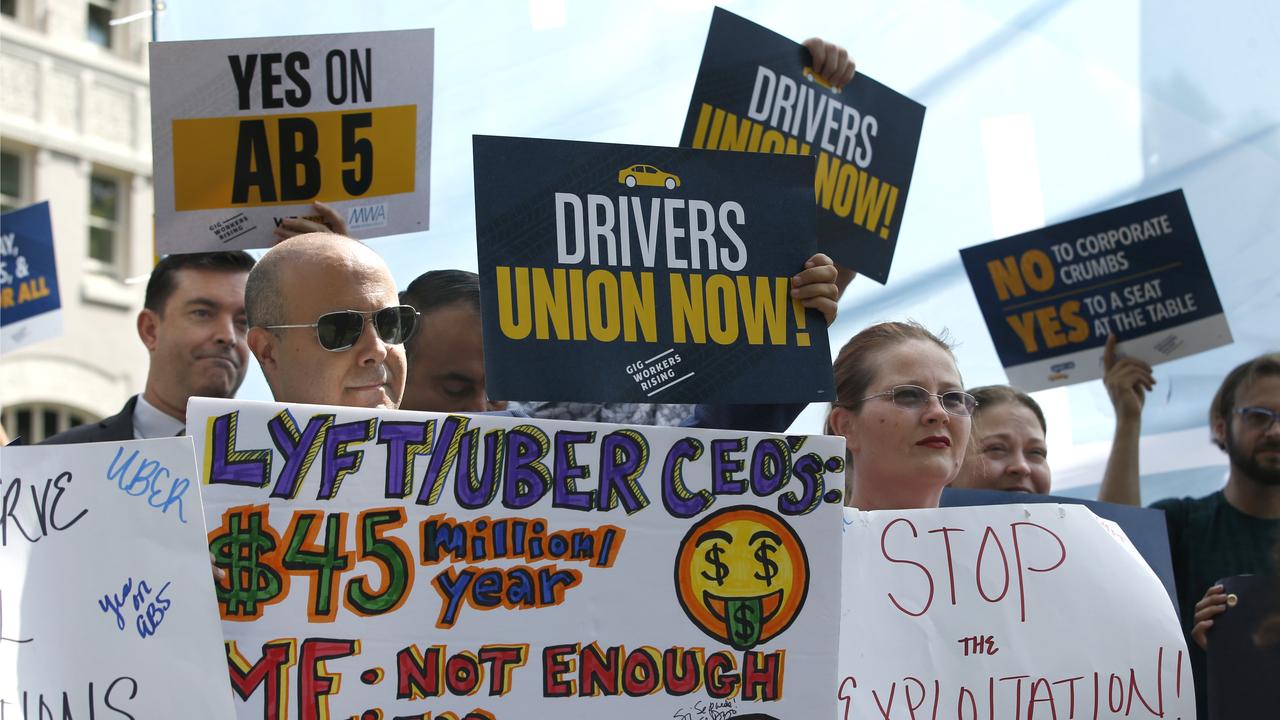Sick of not being stinking rich? Learn from some of the best in the billionaire business
We could all use a little extra cash in our pocket in the New Year, but it’s becoming harder and harder to come by. Luckily we’re here to help.
As we head in to 2020 many of us are focusing on one thing: how to boost our net worth.
Faced with challenging economic times, the much-warned about threat of recession, basement level interest rates and stagnant wages, many Aussies are looking for ways to find a few extra dollars.
Luckily, there’s a few refreshingly simple ways you can add millions — and potentially even billions of dollars to your bank account.
Dressing like departed Apple deity Steve Jobs, convincing people you’re a technology company even when you’re clearly not, and good old fashioned breaking the law are just some of the easy ways you can turn your plucky young start-up into a money printing machine, without all the pesky added pressure of actually turning a profit.
But don’t just take our advice. Smart people learn from their mistakes, wise ones learn from those of others, so here’s a few places to get you started on the path to turning your simple idea into a slightly more complicated idea that venture capitalists will love!
SO YOU WANT TO BE A TECH BILLIONAIRE?
The first thing you’ll want to do if you’re an aspiring tech billionaire is drop out of whatever university you’re currently studying at, preferably Harvard. Bill Gates (Microsoft) and Mark Zuckerberg (Facebook) both famously turned their back on the hallowed campus, although Zuck was almost kicked out before he could drop out. His very normal and classy FaceMash website allowed horny Harvard boys to rate the attractiveness of the women in their classes and he was threatened with expulsion, presumably for violating copyright in using images of the women since there’s clearly nothing wrong with the website he made, at face value or with any more forensic a reading.


Zuckerberg moved on from his little perv website to create Facebook, which was already going off when he decided to turn his back on Harvard.
Meanwhile, having already taken an interest in computers in high school (his alma mater Lakeside Prep, one of the top 15 private schools in the United States, was one of the first to get students access to computers), Gates took official leave to focus on starting his company before actually dropping out of Harvard, meaning he could return to one of the world’s most prestigious colleges if he failed.
Zuckerberg however would be forced to rely on his parents, a psychiatrist and a dentist, if he fell on hard times, though thankfully that never happened.
Of course, if you don’t go to one of the most renowned universities in the world and have parents from wealthy professional backgrounds, you may want to factor this into your SWOT analysis. But really you should have thought of that before you decided to be born into those circumstances, and they should have no bearing on your access to the networks and resources you’ll need to attract funding for your tech company.
BUT WAIT, I DON’T RUN A TECH COMPANY?

Where would our society be if people let simple problems like this get in the way?
Just because you’ve got your heart set on becoming a billionaire tech visionary, doesn’t mean you need to have any kind of detailed technical nous. Steve Jobs famously never wrote any code for Apple, at least according to his co-founder Steve Wozniak.
“He wasn’t an engineer and he didn’t do any original design, but he was technical enough to alter and change and add to other designs,” Mr Wozniak said answering a 2013 email from the public.
Merely having an opinion and being able to direct another person to realise your vision can be enough.
But what if your company objectively has nothing to do with technology?
Simple, just pretend that it does.
Entrepreneurs in the real estate, fitness, and even hospitality industries are beginning to realise the secret power of manifestation: if you believe you’re a visionary tech company, the universe will make it so.

Real estate company WeWork, which sought a $US47 billion valuation as it prepared for a doomed IPO earlier this year, mentioned “technology” more than 100 times in its filings with the United States’ Securities and Exchange Commission (SEC).
Multiple times that was in reference to the technology “infrastructure” in the offices it leases out to young entrepreneurs (possibly even you!).
Does your tech start-up’s home office (which preferably will be in your garage rather than your actual home) have an NBN connection? Congratulations, your company is now backed by technology and well on the way to billions in funding.
This also provides another opportunity for you to increase your own personal net worth by turning your company into your customer, much like WeWork founder Adam Neumann did. Neumann bought several commercial properties he then leased back to WeWork to turn into office spaces.
He has since been removed from the company, so there are risks to this strategy, but he was given more than a billion dollars before walking out the door, so there are also rewards.
FAKE IT UNTIL YOU MAKE IT
This might seem like a lot to take on initially, so it can be useful to look at a case study of a young entrepreneur who managed to pull off all of the above and more.
Elizabeth Holmes dropped out of (not Harvard but still …) Stanford University to start her healthcare company Theranos when she was barely out of her teens.
The daughter of a vice-president at resources and accounting fraud firm Enron, she had a dream to revolutionise the science of blood testing by producing a small machine capable of running detailed tests on just a few drops of blood.
Using her connections and charm, Holmes managed to attract billions in funding for Theranos, however what she’s perhaps most known and mocked for is her mimicry of Steve Jobs.
Holmes regularly copied his black turtleneck uniform, as well as speaking in an artificial baritone voice.

In the wake of her downfall, family members have insisted this voice is her natural one, but at least one former Theranos worker told Wall Street Journal reporter John Carreyrou (whose book Bad Blood: Secrets and Lies in a Silicon Valley Startup exists as something of a bible on Theranos’ laughable rise and fall) that they’d heard Holmes speaking in a voice several octaves higher than the one she reportedly put on.
While lowering her voice can be taken as another sad example of a woman being forced to adopt male traits to be taken seriously in the tech industry, this doesn’t exclude it from being objectively hilarious.
But it wasn’t the only lie believed to be spread by the company.
Holmes eventually settled a lawsuit with the SEC the alleged she lied to shareholders about the blood-testing technology being used by the US Department of Defence.
Theranos was also accused of overstating its revenue, claiming it made $100 million in 2014 when it really made 0.1 per cent of that.
Many former workers at Theranos were more than happy to talk to the press about their experience, describing the culture of lying and deception, proving once again that workers do nothing but get in the way of good business, which means if you want to be a tech billionaire, you’re going to want to …
EXPLOIT YOUR WORKFORCE
Princeton graduate and frat boy Jeff Bezos was a do-nothing Wall Streeter surely destined for a life of poverty before he came up with the idea that would make him the first man in the world to have more than $US100 billion, for some reason.
Amazon may have started as a little company selling books over the internet, but it has since grown into an eCommerce and web services behemoth.
The company sells pretty much anything, including shonky knock offs of existing products made by the company which appear ahead of the rivals it knocks off in searches on the site.
It also makes speakers powered by digital voice assistants that can offer you all sorts of help around the home and also occasionally send recordings of what goes on around your home to human contractors (the company has since added an option for users to tell this assistant to delete those recordings after being caught out along with Apple, Google, Microsoft and more throughout the past year).
Its biggest money spinning division is one of its least talked about: the Amazon web services division that makes up the bulk of its profit.

Amazon is a massive business, and massive businesses require massive workforces.
The best workforces are seemingly ones that are pushed to their physical limits before being disposed of. This is a role best filled by robots, but until it can get those working properly, Amazon appears willing to make do with real life people.
Overwhelming reports from former and current Amazon workers detail a company that constantly monitors their employees and pushes them to the absolute edge, while of course paying them as little as possible.
The enforcement of “Amazon pace”, described as a mixture between walking and jogging, is just one of the ways this manifests, and worker mistreatment isn’t limited to the US. Employees at the Melbourne warehouse told ABC Newsearlier this year they were working under a culture of fear, forced into casual positions they could lose at any moment.
One worker described feeling “dehumanised”, saying Amazon “resent the fact that I’m not a robot”.
There is danger in this strategy. If worker morale falls too low, they may make the radical decision to unionise, but there are also ways around this too.

Google, once considered the coolest place in the world to work, has been facing a growing wave of backlash from employees who are beginning to realise that ping pong tables and beanbags aren’t the kind of workplace perks you value beyond your early twenties.
As a very smart company run by geniuses, Google has now seemingly decided to start allegedly firing those workers at the core of the union movement within the company.
While we’re still waiting to see exactly how this strategy pans out, we’re sure it will be another massive success along with things like Google Glass, Wave, Circles, or other names you don’t recognise.
And by now you might be thinking, “wait, isn’t suppressing unionisation efforts illegal?”
Not to worry.
When building a billion dollar mega tech corporation of your own, you’re going to want to remember the sage advice of disgraced Commonwealth Bank CEO Ian Narev, “temper your sense of justice”, and quite simply …
BREAK THE LAW
Uber, the rideshare app that touted itself as being the conduit for you to hire “your own personal driver” while not actually hiring any drivers of its own, experienced a meteoric rise this decade.
Part of this meteoric rise involved an aggressive expansion to all corners of the globe, frequently coming into areas formerly dominated by traditional taxi companies and disrupting them with its cheaper rides and tech powered booking system.

This expansion required routinely ignoring the rules and regulations around personal transport in many jurisdictions until they were eventually changed to favour them.
While arguments can be made that these laws were outdated and in need of updating anyway, this excuse won’t work for your average marijuana dealer so they shouldn’t work for billion dollar tech companies either.
Regardless of how they did it, Uber has now been allowed to stay and continue operating in most of the markets it forced its way in to.

Now if the company could finally turn over even one measly dollar in profit the venture capital investors that have been subsidising our cheap rides for the past five years can be happy.
That probably won’t happen until self-driving cars (which will require further regulatory updates) reach maturity, which will finally allow Uber to replace its quasi-workforce of contracted drivers with … you guessed it: robots.
NOW IT’S YOUR TURN
By now you should be well equipped to handle all the challenges running a business could throw at you, so let’s get active! Ditch that degree. Pull on that turtleneck. It’s time to move fast and break things, pull yourself up by your bootstraps and begin a systematic process of lying, deceiving, or otherwise cheating your way to becoming a billionaire.
If that fails you could always try investing in the next Bitcoin.
Which of these foolproof tips are you planning to try first, or do you have a better one? Let us know in the comments below.



